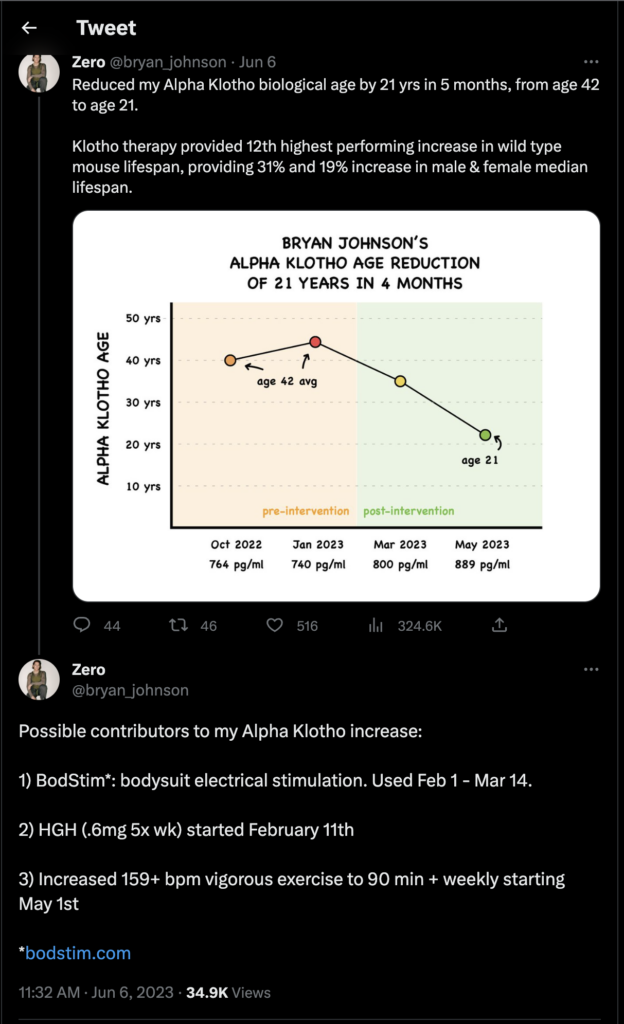Bryan Johnson, the CEO known for his extravagant pursuit of reversing aging, has recently announced that he saw “no benefits” after undergoing a controversial procedure involving the injection of his son’s plasma to reverse his biological age. Johnson, along with his then 17-year-old son and 70-year-old father, participated in what was claimed to be the world’s first multigenerational plasma exchange earlier this year. The procedure aimed to potentially influence age-related brain decline, with a team of over 30 doctors approving the protocol.
However, Johnson now reveals that meticulously monitoring various biomarkers from his fluid yielded no positive results. In a tweet shared recently, he disclosed that he underwent six one-liter “young plasma exchanges,” one of which involved his son’s plasma. Johnson clarifies that while young plasma exchange may have benefits for older populations or specific conditions, it did not provide any additional advantages in his case. He suggests that alternative methods of plasma exchange or young plasma fractions hold promise.
The procedure involved extracting a liter of blood from a young donor and separating it into red blood cells, white blood cells, platelets, and plasma. The converted plasma was then injected into the recipient’s veins with the goal of regenerating parts of the body for anti-aging purposes. Johnson and his son both contributed their blood, with Johnson receiving his son’s plasma while his own plasma was injected into his father’s veins. The results for Johnson’s father are still pending.
 Bryan Johnson gained attention earlier this year when he was profiled by Bloomberg for his lavish spending and disciplined approach to anti-aging. His anti-aging regimen, known as “Project Blueprint,” involved strict dieting, exercise, a regulated sleep routine, and regular organ and blood tests to track his biological age. Plasma transfusion was just one of the many procedures he underwent in his pursuit of longevity, although it remains a controversial method.
Bryan Johnson gained attention earlier this year when he was profiled by Bloomberg for his lavish spending and disciplined approach to anti-aging. His anti-aging regimen, known as “Project Blueprint,” involved strict dieting, exercise, a regulated sleep routine, and regular organ and blood tests to track his biological age. Plasma transfusion was just one of the many procedures he underwent in his pursuit of longevity, although it remains a controversial method.
In 2017, a California start-up called Ambrosia offered young plasma transfusions for $8,000 per liter. However, it ceased operations in 2019 following a warning from the FDA regarding such plasma transfers. The FDA stated that there is no proven clinical benefit in using plasma from young donors to treat age-related conditions, emphasizing the lack of rigorous testing and potential risks associated with these products. Plasma transfers have been used for severe infections, burns, and blood disorders, but their use for anti-aging purposes lacks conclusive evidence.
While studies on mice have shown potential regeneration effects in the brains, muscles, and tissues of older mice receiving young blood transfusions, these associations have not been proven in humans. Researchers are now focusing on identifying specific molecular factors responsible for age-related diseases, such as age-related macular degeneration or Alzheimer’s disease, rather than attempting to reverse aging through plasma transfusions.
Although the plasma exchanges were deemed to have “no benefits” by Johnson, he has reported a reduction in his Alpha Klotho biological age by 21 years in just five months, going from age 42 to age 21. Furthermore, others are currently preparing to have their baseline Klotho levels tested and undergo the Bodstim suit and Klotho protocol in a 12-week test. New data will be reported as it becomes available.
While the young plasma transfusions did not yield the desired results for Johnson, his ongoing efforts and exploration of different approaches to anti-aging continue to push the boundaries of scientific understanding in this field.

